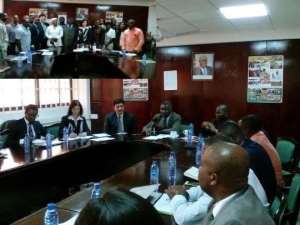
A delegation of the United Nations Industrial Development Organisation (UNIDO) on Thursday held discussions with officials of the Ministry of Environment, Science, Technology and Innovation on how to reduce mercury usage in artisanal mining.
The meeting, also attended by members of the Inter-Ministerial Committee on Illegal Mining (IMCIM), representatives of Small-Scale miners and other stakeholders, also briefed participants on a UNIDO collaborative project aimed at supporting Ghana to gradually eliminate mercury usage in the country.
A Minamata Convention on Mercury adopted by countries, including Ghana in August this year, has an article that talks about artisanal small-scale gold mining (ASGM), which stipulates that countries develop national action plans for the gradual elimination of mercury.
Mercury is very harmful to the health of humans, animals, and the general environment.
The Convention has a Global Environment Fund from which countries could assess funds through implementation agencies, of which Ghana and UNIDO had partnered to access 500, 000 dollars to run the artisanal mining project.
The Convention also requires the reduction and the elimination of the use of mercury and the use of sustainable technologies in compliance to environmental needs of local communities.
The meeting, therefore, discussed how Ghana could integrate the Minamata Convention on Mercury in its progammes.
Professor Kwabena Frimpong-Boateng, the Minister of Environment, Science, Technology and Innovation, said because activities of illegal mining was heavily polluting the environment, the Government placed a ban on artisanal small scale mining in the course of this year.
He said that action was to enable the Government to partner with stakeholders to sanitise the sector, adding that; 'The challenges encountered in the mining sector give Ghana the opportunity to do things right and better'.
He said the Minamata Convention seeks to regulate and ultimately ban the use of mercury in artisanal mining and in the health sector, and it was in that vein that UNIDO was partnering Ghana to carry out its obligation.
The Minister said already, a national action plan had been started to help Ghana deal with mercury poisoning, especially in artisanal gold mining.
He said that National Action plan fitted into what President Nana Addo Dankwa Akufo-Addo had commissioned the nine-member Ministerial Committee to do in dealing with the challenges in the mining sector.
'We need to draw our national action plan, set up certain structures and put in certain measures and articulate our needs so that eventually, we can get funding to deal not only with this menace but also to look at the health effects, for example examine people, examine the soil and some of the fish, to see how they will impact on human health.
'We need to teach our artisanal gold miners how to mine sustainably, especially with the use of equipment that will not need the deployment of mercury,' Prof. Frimpong-Boateng said.
Ms Rodica Ella Ivan, Industrial Development Officer of UNIDO, said by its mandate, UNIDO supports inclusive and sustainable industrial development, which is one of the SDGs and a higher priority for the Organisation.
She said the artisanal small scale gold mining was an issue that fell within sustainable development management issues, and that the UNIDO project aims to support authorities in developing an action plan to better regulate the artisanal mining sector.
It also seeks to supporting the sector with technology transfer and know-how and reducing mercury use and its total elimination ultimately, to the benefit of local communities.
'UNIODO will continue working with the relevant stakeholders in the countries to support the artisanal gold mining sector,' Ms Ivan said.
The project is a two-year project that started in 2017, involving partner agencies like the Environmental Protection Agency, the Ghana Health Service, and the World Health Organisation to gather data among mining communities, educate miners on harmful effects of mercury and provide mercury-free technology in the mining sector.
GNA
By Lydia Kukua Asamoah, GNA




 Saglemi Housing Project will not be left to rot – Kojo Oppong Nkrumah
Saglemi Housing Project will not be left to rot – Kojo Oppong Nkrumah
 Transport fares hike: GPRTU issue two-day ultimatum
Transport fares hike: GPRTU issue two-day ultimatum
 ARC endorses Alan as presidential candidate – Buaben Asamoa
ARC endorses Alan as presidential candidate – Buaben Asamoa
 Akufo-Addo appoints Kwasi Agyei as new Controller and Accountant-General
Akufo-Addo appoints Kwasi Agyei as new Controller and Accountant-General
 PNC dismiss reports of mass resignations
PNC dismiss reports of mass resignations
 PAC advocates for revenue collectors to be engaged on commission basis, not full...
PAC advocates for revenue collectors to be engaged on commission basis, not full...
 Genser Energy commissions 110km of natural gas pipeline at Anwomaso
Genser Energy commissions 110km of natural gas pipeline at Anwomaso
 Naa Torshie calls for tolerance, peace ahead of 2024 election
Naa Torshie calls for tolerance, peace ahead of 2024 election
 Asantehene commends Matthew Opoku Prempeh for conceiving GENSER Kumasi Pipeline ...
Asantehene commends Matthew Opoku Prempeh for conceiving GENSER Kumasi Pipeline ...
 Let’s do away with ‘slash and burn politics’ in Ghana — Dr Adutwum
Let’s do away with ‘slash and burn politics’ in Ghana — Dr Adutwum
